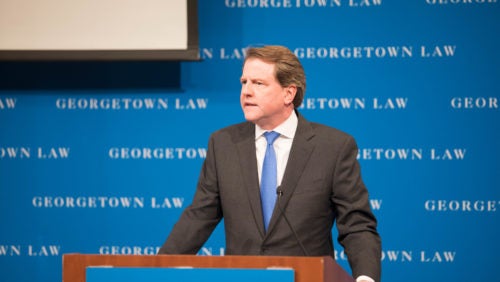Georgetown Law Hosts ABI Health Care Conference Featuring Don McGahn
January 29, 2019

Former White House counsel Don McGahn delivered opening remarks at the January 17 American Bankruptcy Institute (ABI) conference on health care, hosted by Georgetown Law CLE.
Regulatory reform in health care “helps economic growth, helps promote innovation, because it frees people to think a little differently,” former White House counsel Donald McGahn said in opening remarks at the January 17 American Bankruptcy Institute (ABI) conference on health care, hosted by Georgetown Law Continuing Legal Education.
“It helps job creation, and it creates confidence…if you know that the government is not going to impose new and additional regulations, it gives folks a chance to think about taking things to the next level.”
The conference, “Disruption, Consolidation and Innovation in the Health Care Industry” featured sessions on restructuring, reimbursements and investment opportunities and a panel with industry CEOs, plus a keynote luncheon speech by former Vermont governor and physician Howard Dean.
McGahn focused on deregulation, citing the success of Trump Administration executive orders in achieving regulatory cost savings. “If one looks in terms of economics, the past fiscal year eliminated 23 billion dollars in overall regulatory costs…” he said. “The total over the past two fiscal years is 33 billion dollars.”
The Department of Health and Human Services, he said, saved an estimated 8.2 billion dollars. “All this adds up to regulatory savings, and a better system,” he said.
McGahn asserted that courts “have abdicated their responsibility to hold agencies accountable for what they are doing in the regulatory world.” The president’s selection of judges, he said, represents “a certain approach to administrative law and fundamentals: separation of powers, and who actually makes the laws in the country.”
“It’s not just deregulation for the sake of deregulation,” he said. “The fact of the matter is, one looks at the text of the Constitution — the idea of agencies is firmly entrenched in our Republic since the founding…certainly the vast ‘alphabet soup bureaucracy’ of Washington, D.C., could not have been envisioned at the time of the founding.”
There is certainly a need for regulation, he said, with respect to food and medicine. “What I’m talking about is overregulation.”
How does this tie in to recent challenges to the Affordable Care Act — in particular the opinion issued by Texas federal District Judge Reed O’Connor in Texas v. Azar? In the wake of the ACA’s individual mandate being zeroed out in the recent tax reform law, O’Connor struck the individual mandate and the entire ACA.
“Some commentators call it an absurd suit. It’s a very real suit,” McGahn asserted. “I think it’s very clear that the idea the [ACA individual] mandate no longer is a tax does cause it to fall. But the severability issue is one that’s going to be very interesting.”
A Different Approach to Reform
Former Governor Howard Dean took a different approach to reform, focusing directly on the structure of health care delivery. “It is pointless to talk about health care unless you get rid of fee-for-service medicine,” he said. “We are getting paid only when you get sick, and the sicker you get, the more money we make.”
One solution, Dean explained, is the Accountable Care Organization. Originally designed for Medicare, the ACO model has been implemented successfully in hospital systems in Massachusetts, essentially merging insurance and medical systems, with the consumer paying a flat fee and the provider assuming the risk.
“Once you assign the risk to the providers — guess what — instead of paying us for how sick you get, you pay us for how well we keep you. So all the incentives are now flipped upside down.”